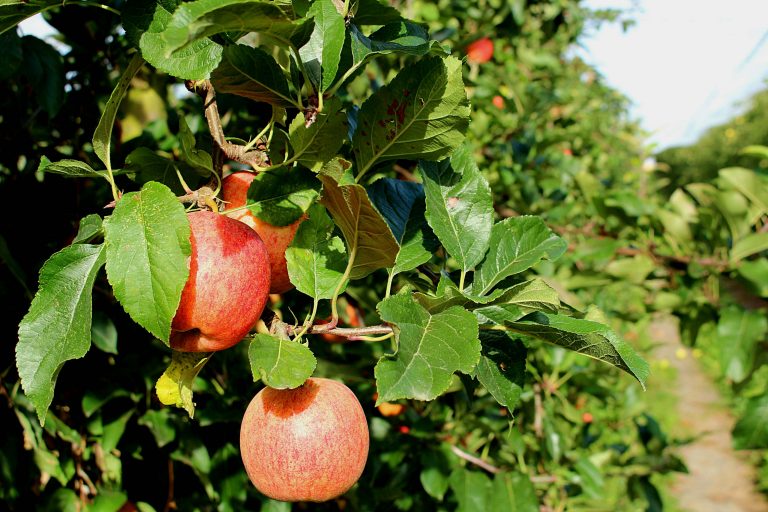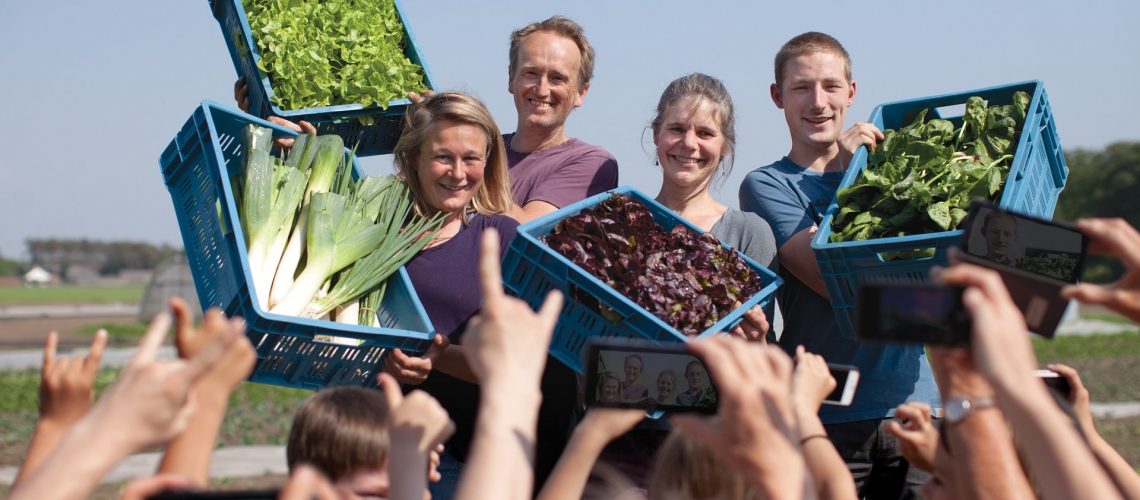Short chain is about much more than ‘a few kilometres between the producer and the consumer’. It is firstly about the autonomy of farmers, about producers who can decide on their pricing and business operations for themselves.
Sofie Vanthournout Tweet
“Voedselteams (‘food teams’) is a movement of people wanting more control over how their food is produced. We started out 25 years ago and now have 120 teams all over Flanders. Each Voedselteam is a small group of consumers who buy their food from local producers. These producers set their own fair pricing, taking into account their costs and the environmental impact of their products.” How does this work exactly? What requirements does a producer need to meet in order to sell to Voedselteams? And what role do volunteers play in this organisation? We put all these questions to coordinator Sofie Vanthournout.
“Here too, in our own country, farmers hardly get any say in their own business operations,” says Sofie. “Often they have absolutely no control over the far too low prices the food industry pays them, and they are weighed down by sizeable loans. Because of this, they usually cannot simply walk away from the conventional system. We offer them an alternative sales channel. Through us, consumers can also buy local, sustainable and fair food products.”
Who are the Voedselteams producers?
A typical Voedselteams producer is small-scale, environmentally conscious, and convinced that our food system can be different. Sofie Vanthournout: “Many see this as their way of rebelling against the current system. They are constantly looking for more sustainable ways of farming or processing food. What you also notice is that they’re extremely motivated to overcome the barriers that stand in their way. They are also innovative in terms of business model, because switching to a short-chain system requires enormous investment and change in mindset.”

What requirements does a producer have to meet in order to sell via Voedselteams? The organisation screens each producer using a self-developed Participatory Guarantee System (PGS). This combines a very extensive questionnaire with regular site visits to the producer.
Sofie: “We don’t apply a list of strict criteria to producers, but we also look at their plans and commitment to change. There is room for growth. A producer with certain attention points can still become a member if they can show us a concrete plan.”
The questions we ask candidate producers are about sustainability in the broadest sense. They assess their approach in terms of ecology, dealing with employees, water and energy consumption, transparency, traceability, business operations… “For producers who sell processed products, we also look at their packaging, the origin of the ingredients they purchase, and so on,” Sofie adds.
After the questionnaire, a site visit takes place. A group of producers, who are already Voedselteams members, and specially trained volunteers screen the candidate producer while providing advice and support. These people are on a continuous learning path during which they receive regular training.
How Voedselteams support local farmers
“First of all, by paying fair prices,” says Sofie Vanthournout. “Producers decide on their prices themselves. In the online store, our consumers also get very transparent pricing for each product: how much does the producer receive, how much goes to transport and administration, and so on.”
Out of principle, Voedselteams do not negotiate prices with producers. But critical consumers do to a certain extent keep things in check. Sofie: “By questioning the producers about their products, their cultivation methods and their prices, the consumers are helping to drive change. The producers are happy to discuss these things, as it is a valuable opportunity for them to learn.”
Through the local teams, the national non-profit organisation Voedselteams does its best to offer producers a stable sales channel. “Both for their crop planning and for their income, it’s important for producers to be able to estimate how much they will be able to sell through us,” explains Sofie.
Even though organising sustainable trade between producer and consumer may be Voedselteams’ most important activity, the organisation also offers knowledge and practical help to producers who want to develop or experiment. Sofie gives this example: “A farmer who experimented with chickpeas discovered it was very difficult to find sales outlets. The auctions in our country are not designed to trade chickpeas. And they can’t adapt just for one experimental field with that crop. But we can. With Voedselteams, the chickpeas flew off the shelves!”
Volunteers leading the way
Volunteers play a central role in much of what the Voedselteams do. Within a local Voedselteam, the members themselves decide how things work: which volunteer does what, when and where members pick up their order etc. A team also decides for itself which producers to buy from. Or rather: the national non-profit organisation might approve a producer, but a local Voedselteam can apply stricter criteria if it wishes.
It is also the volunteers who recruit customers for the producers, so they can invest their time in things like sustainability. Volunteers also help distribute the food from the producers to the various Voedselteams. And they are indispensable in monitoring and supporting producers.

“If we had to pay people to do all this work, it would become very expensive. Thanks to our volunteers we can keep things the way they are. In addition, it gives us the space to experiment, which doesn’t exist in the normal trading system,” says Sofie Vanthournout.
Balancing ideology and efficiency: Voedselteams’ challenges
The umbrella non-profit organisation Voedselteams supports local volunteer groups and producers. Sofie sees four major challenges in the years to come.
- Keeping the volunteer movement running
Four regional coordinators motivate the local teams, encourage them to recruit new members, ensure collaboration between teams and with producers, you name it… “For many members, the Voedselteam is an important part of their social network,” Sofie notes. “In addition, it is our task to continue to motivate the volunteers to generate sufficient sales for our producers. Only if their efforts deliver results can we keep our system running.” - Optimising the distribution of products
Sofie refers to the distribution from producer to consumer as a constant search for balance. “Do we work with farmers who are very close to the teams, or also with farmers from a slightly wider region, so that we can organise the distribution of products more efficiently? We notice that where we push efficiency too far, we lose our members’ engagement. And when we look too much at the ideological — and for example only allow farmers from really close by — we no longer work efficiently enough and producers drop out.”
The national Voedselteams organisation coordinates distribution by region — about half of a province. “One of the producers collects food from the others in the area and distributes it amongst the Voedselteams in the same region. This reduces the pressure on any individual producer. For consumers, this collaboration with farmers from just a little further away has the advantage that they get a wider range of products in their Voedselteam.” - Making a future success of the short chain
The range of short-chain products is growing, and more and more producers are investing in it. Sofie: “We notice that consumer interest is growing much more slowly than the supply. As a result, existing short-chain initiatives threaten to have to compete with each other. Demand seems to have picked up a bit since the corona crisis, but it is not yet clear whether this will continue. Either way, it’s important that demand rises sharply, because short chain is the way to go for the future. We regularly consult with other short-chain initiatives and all agree: we shouldn’t steal each other’s customers, rather those of non-sustainable organisations. We are working towards this together, for example with our policy work.” - Getting rid of greenwashing
“In all supermarket chains nowadays you see photos of the farmers they buy from. But that doesn’t make what they do a short chain. It is also about much more than ‘a few kilometres between the producer and the consumer’. It is firstly about the autonomy of farmers, about producers who can decide on their pricing and business operations for themselves. In retail, that’s still a challenge. And then a product might be local, but definitely not deserving of the description ‘short chain’. Flemish Minister for Agriculture, Crevits, is focusing on local, but through the retail sector. In doing so, she’s sweeping the real short-chain principle under the carpet. But for the average consumer, the difference really isn’t clear. This is something we’re very concerned about.”
Experience sharing to change the food system
The goal of Voedselteams is to change the food system. Sofie: “That is why we are and remain very consciously a movement. In addition to our way of working, we want more alternatives to the current system. That is why we are happy to share the insights we have gained over the past 25 years. With policymakers, like-minded initiatives and consumers other than our own members. We want to inspire and motivate others to pursue the same goals. Without necessarily wanting to scale up our own model.”
The umbrella non-profit organisation is involved in influencing policy by advising the government, and through an occasional open letter in the press. For this, Voedselteams usually works together with partner organisations such as Wervel and the Voedsel Anders coalition.
But the biggest ‘political’ impact Voedselteams has is on a local level. Many local volunteers also sit on city councils and local sustainability councils. In Sofie’s experience, “all that local impact combined is very effective if you want to change something”.
Text: Griet Rebry
Photos
Heading: Kijfelaar – © Voedselteams
Photo 1: Aanbod Voedselteams © Voedselteams
Photo 2: Zonnekouter – © Voedselteams
Lees ook

Local fair trade in Belgium and Europe
Belgian and European fair trade in local products is on the up. At least 52.4 million euros worth was sold in 2019. In 2019 the


